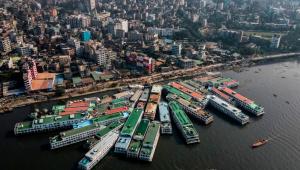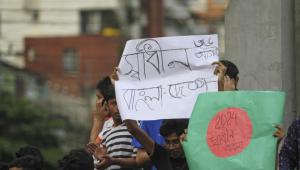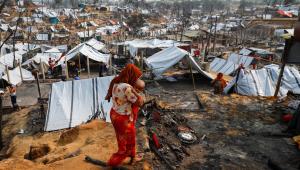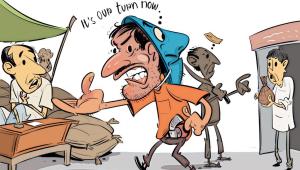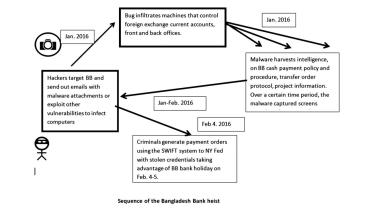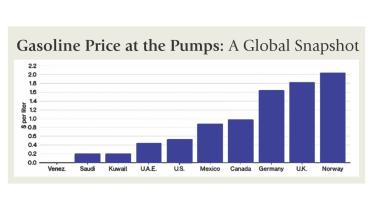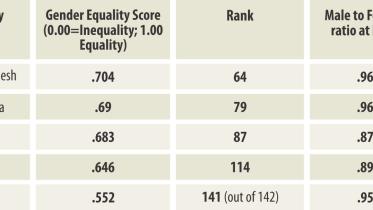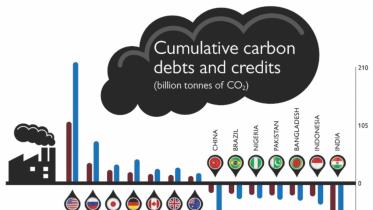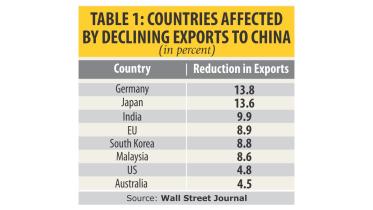Blue Afternoon
Sarah has not seen Naeema since then. She had heard from her other sons that Naeema is teaching in a school and staying with her mother.
1 April 2016, 18:00 PM
Blue Afternoon
The call to prayer wakes Sarah up every morning. There are at least three mosques surrounding her apartment and each of them take
18 March 2016, 18:00 PM
Need for better systems and protocols
The news that foreign hackers attempted to off $101 million from Bangladesh Bank's account with the Federal Reserve Bank of New York need not be viewed as a catastrophic failure...
13 March 2016, 18:10 PM
Petroleum price: Reduce price and add a green tax
BANGLADESH is now poised at a historically opportune moment to initiate a “green tax” on carbon-emitting fuels. International oil
2 March 2016, 18:00 PM
Can we get rid of this mood of “gloom and doom”?
Is the world economy coming to a catastrophic, grinding crash? Would we see a global meltdown with GDP in a tailspin...
24 February 2016, 18:00 PM
Monday Morning Blues
It was on a Monday morning that I was running late for work. To compound my problems, traffic was heavier than usual and only later,
19 February 2016, 18:00 PM
Can lower price hurt the economy?
While lower fuel cost may keep the cost of driving low and the opportunity cost of conservation high, the setback is predicted to be temporary.
16 February 2016, 18:00 PM
Outshining our neighbours in gender equality
Many years ago, in 1992, after Amartya Sen had just moved to Cambridge, USA, to take up his residence at Harvard University, I met
15 January 2016, 18:00 PM
Will Bangladesh be "compensated" for loss and damage?
Bangladesh is in the frontlines of mounting costs of climate change. With the United Nations Summit on Climate Change scheduled to
28 November 2015, 18:00 PM
The brewing feud in South China Sea
The number one and number two global economic powers, USA and China respectively, appear to be venting their frustrations with each
7 November 2015, 18:00 PM
What can we expect in the next months?
In the coming months, the world economy will go through a period of gusty weather. A key indicator of global financial well-being is
31 October 2015, 18:00 PM
Financing gap in climate action
At the forthcoming Climate Change summit in Paris, two parallel threads of conversations will take place in different conference rooms:
15 October 2015, 18:00 PM
Can China's economic woes derail world recovery?
In these times of interconnected economies, China's recent economic troubles seem to be the last straw that broke the camel's back. First of all, less growth in China spells trouble for its trading partners. But there is another worrisome development for ROW. China, after years of goading from IMF and US economists, is undertaking a policy shift in an attempt to change its economic growth paradigm.
29 September 2015, 18:00 PM
DHAKA'S TRAFFIC GRIDLOCK
Two recent op-ed articles on the pages of The Daily Star caught my attention. The first one was written by architect and planner Adnan
23 September 2015, 18:00 PM
Where's the Problem?
There is a saying, “If it ain't broke, don't fix it!” Do we as a nation suffer from the same mindset? I am talking about the total dependence of the country on one group of commodities for its exports. Over the last two decades, we have successfully realigned our
22 August 2015, 18:00 PM
A war-cry for sustainable development goals
During the 1992 presidential campaign in the USA, candidate Bill Clinton's campaign adopted a very powerful short message to convey to the party faithfuls and voters that the poor performance of the US economy should be the centerpiece of any conversation to unseat the incumbent President George Bush.
7 August 2015, 18:00 PM
Climate Agreement in December: A Miracle in Paris?
Financing of the efforts to mitigate the climate-change effects and provide resources to the affected countries is an important element of the next international agreement. Progress on commitment of resources to fund climate projects has been, as expected, sluggish.
31 July 2015, 18:00 PM
Can the Greek Referendum offer any lessons?
In a historical referendum on July 5, 2015, the Greek voters overwhelmingly sided with the current government in its debt negotiations with its European partners.
9 July 2015, 18:00 PM
“Distressed” RMG Industries
Areas where further progress was needed are labour organisation in EPZ, negative publicity regarding harassment of NGOs and labour unions, and lack of data and transparency on factory inspections.
1 July 2015, 18:00 PM
Trans-Pacific Partnership Treaty and Bangladesh
The Trans-Pacific Partnership (TPP) treaty currently under negotiation could potentially affect Bangladesh's economy in the near future, although at this point it is not clear how large the impact might be since many of the details are still under wrap.
14 June 2015, 18:00 PM








